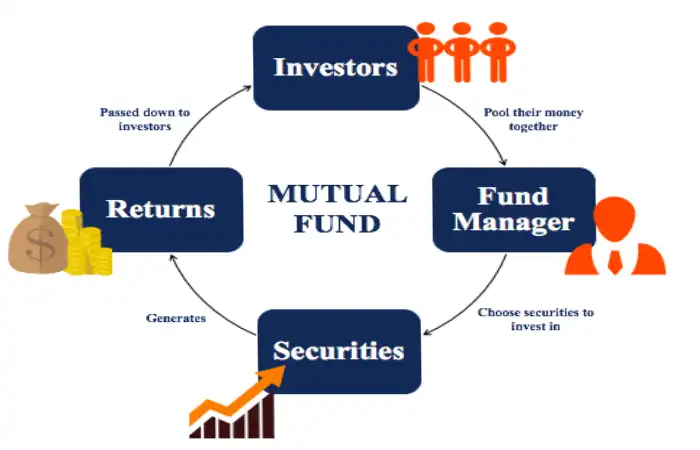 Mutual Funds Write for Us: A mutual fund is a pool of money be able to by an expert Fund Manager. A trust collects money from several investors who share a common investment objective and invests it in justices, bonds, money market instruments, and other securities.
Mutual Funds Write for Us: A mutual fund is a pool of money be able to by an expert Fund Manager. A trust collects money from several investors who share a common investment objective and invests it in justices, bonds, money market instruments, and other securities.
The income/gains generated from this pooled investment are distributed respectively amongst the investors after deducting applicable expenses and levies by calculating a scheme’s “Net Asset Value” or NAV. Just put, the money pooled in by many depositors is what makes up a Mutual Fund.
Here’s a simple way to understand the concept of a Mutual Fund Unit.
Money plays a significant role in the modern economic life of the human being. Sinking funds is the method of the government creating a separate fund called a sinking fund for repaying public debt. A part of the general revenue is deposited into this fund every year so that public debt repay from the funds. This considers the best method of redemption.
The method of government repays part of the public debt every year. Such annual payments, including interest, are made regularly till the debt is completely clear. Refunding implies the issue of new bonds and securities by the government so that loans can use to repay public debit.
Mutual funds are ideal for investors who also lack large sums for outlay or those who neither have the feeling nor the time to research the market yet want to grow their wealth. Professional fund directors invest the money collected in mutual funds per the system’s objective. In return, the fund house charges a small fee which deducts from the investment. The fees charged by mutual funds are planned and are topic to certain limits definite by the Securities and Exchange Board of India.
India has one of the maximum savings rates globally. This desire for wealth creation makes it essential for Indian investors to look beyond the traditionally favored bank FDs and gold toward mutual funds. However, a lack of awareness has made mutual funds a less preferred investment avenue.
Mutual funds offer multiple product choices for investment across the financial spectrum. The products required to achieve these areas vary as investment goals vary – post-retirement expenses, money for children’s education or marriage, house purchase, etc. The Indian mutual fund business offers many systems and caters to all nominee needs.
What Types of Mutual Funds are there?
 Most mutual funds reduction into one of four main groups – money market funds, bond funds, stock funds, and mark date funds. Each type has different landscapes, risks, and plunders.
Most mutual funds reduction into one of four main groups – money market funds, bond funds, stock funds, and mark date funds. Each type has different landscapes, risks, and plunders.
Money market funds: have relatively low risks. By law, they can invest only in certain goods, short-term investments issued by U.S. corporations, and federal, state, and local rules.
have more complex risks than money market funds because they classically aim to produce higher returns. Because there are many different kinds of bonds, the dangers and plunders of bond funds can vary intensely.
Stock funds: invest in business frameworks. Not all stock funds are the same. Some examples are:
- Growing funds focus on stocks that may not pay a consistent dividend but have the potential for above-average financial gains.
- Income funds capitalize on stocks that pay regular extras.
- Index funds track a detailed market index, such as the Standard & Poor’s 500 Index.
- Sector funds specify a specific industry segment.
Target date funds hold a mix of frameworks, bonds, and other reserves. Over time, the mix slowly shifts according to the fund’s strategy. Target date funds, sometimes known as lifecycle funds, are designed for folks with particular retirement dates.
What are the Benefits and Dangers of Mutual Funds?
 Mutual funds proposal expert investment is running and potential change. They also offer three ways to earn cash:
Mutual funds proposal expert investment is running and potential change. They also offer three ways to earn cash:
- Dividend Expenses: A fund may earn income from extras on stock or interest on bonds. The fund then pays the stockholders nearly all the gain, less outlays.
- Capital Gains Circulations: The price of the refugees in a fund may increase. When a fund sells a stake that is more significant in price, the fund has a wealth gain. At the end of the year, the fund allocates these capital gains, minus any wealth losses, to savers.
- Enlarged NAV: If the marketplace value of a fund’s portfolio rises after taking outlays, then the value of the fund and its shares increases. The higher the NAV reproduces, the higher the value of your asset.
All funds carry some equal risk. With mutual funds, you may misplace some or all of the money you invest since the refuges a fund holds can go down in value. Extras or interest payments may also change as market situations change.
A fund’s past performance is not as important as you think because the past acts are, But past artifacts can tell you how volatile or stable a fund has been over time. The more volatile the fund, the higher the asset risk.
How to Buy and Sell Joint Funds
Depositors buy mutual fund shares from the fund itself or do a broker for the fund rather than from other investors. The price investors pay for the mutual fund is the fund’s per part net asset value plus any fees charged at purchase, such as sales loads.
Mutual fund shares are “redeemable,” meaning nominees can sell the stocks back to the fund anytime. The fund typically must send you the sum within seven days.
How to Submit Your Articles
To Write to Us, you can email us at contact@thewhoblog.com
Why Write for Us The Who Blog – Mutual Funds Write for Us
 Writing for The Who Blog can give massive exposure to your website for customers looking for Mutual Funds. The Who Blog presence is on Social media and will share your article with the Mutual funds-related audience. You can reach out to Mutual Funds enthusiasts.
Writing for The Who Blog can give massive exposure to your website for customers looking for Mutual Funds. The Who Blog presence is on Social media and will share your article with the Mutual funds-related audience. You can reach out to Mutual Funds enthusiasts.
Search Related Terms to Mutual Funds Write for Us
- common sense on mutual funds John Bogle
- mutual funds
- bogle on mutual funds
- mutual funds for dummies
- common sense on mutual funds
- morningstar guide to mutual funds
- mutual funds for Dummies 2019
- john bogle’s common sense on mutual funds
- mutual funds for Dummies 2017
- mutual funds for Dummies 2018
- wealth without stocks or mutual funds
- common sense mutual funds
- mutual funds for beginners
- vanguard mutual funds
- investing in mutual funds
- common sense on mutual funds fully updated 10th-anniversary edition
- mutual funds books
Article Guidelines on The Who Blog – Mutual Funds Write For Us
The Who Blog welcomes fresh and unique content related to the Mutual Funds Write For Us.
The Who Blog allows at least 500+ words related to Mutual Funds Write For Us.
The editorial team of The Who Blog does not encourage promotional content related to Mutual Funds Write For Us.
For publishing an article at The Who Blog contact@thewhoblog.com
